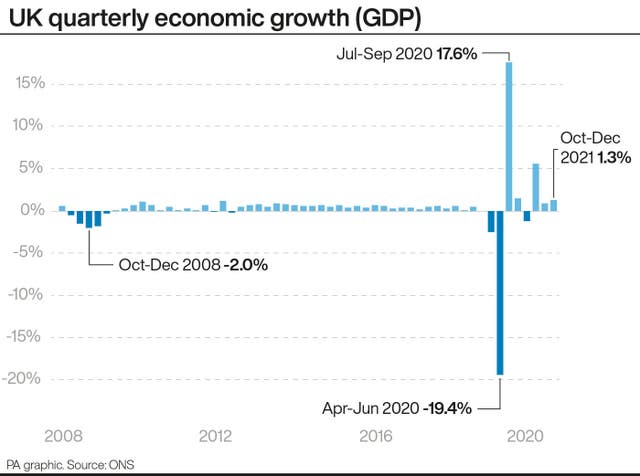
Shelagh Fogarty 1pm - 4pm
31 March 2022, 08:52

The ONS said the economy accelerated to 1.3% growth in the fourth quarter of the year, compared with the initial estimate of 1%.
The UK economy grew at a faster pace than first thought in the final three months of 2021 despite the spread of the Omicron variant of coronavirus, according to official figures.
The Office for National Statistics (ONS) said economic growth accelerated to 1.3% in the fourth quarter of the year, compared with the initial estimate of 1%.
It marked a bounceback on downwardly revised growth of 0.9% in the third quarter of last year.

But the Bank of England and Office for Budget Responsibility (OBR) have forecast a hit to growth this year and next as the Ukraine crisis heightens the cost-of-living squeeze, with households and businesses expected to rein in their spending as prices soar.
In a sign of the impact of rocketing prices, the ONS data showed that household disposable income after inflation fell by 0.1% in the fourth quarter.
This meant Britons began dipping into the nest eggs they had built up during the pandemic lockdowns, with household savings falling to their lowest since the start of the pandemic.
The household savings ratio dropped to 6.8% in the fourth quarter, down sharply on the 7.5% seen in the previous three months.
The OBR warned last week that households will suffer the biggest fall in real incomes since records began in 1956 as it forecast inflation will peak at 8.7% in October.
The household saving ratio fell to 6.8% in Q4 as income grew 1.3% but spending grew 1.9%, driven by rising prices https://t.co/SCmRO7lBOy pic.twitter.com/DLYkuls8U6
— Office for National Statistics (ONS) (@ONS) March 31, 2022
The ONS said gross domestic product (GDP) was 0.1% below where it was before the pandemic and within touching distance of its pre-Covid peak in the fourth quarter.
But revisions to GDP figures for the past two years means the economy grew by 7.4% in 2021 – still a record rebound, but lower than the 7.5% initial estimate.
The ONS said this comes after it revised the record-breaking GDP drop at the height of the pandemic in 2020 to 9.3%, against the 9.4% first estimate.
Darren Morgan, director of economic statistics at the ONS, said: “GDP grew a little stronger than we first thought in the fourth quarter, meaning it is now only 0.1% below its pre-pandemic level.
“Savings were at their lowest level since the start of the pandemic as household spending rose, mainly driven by rising prices.
The ONS said the stronger GDP figures for the fourth quarter were due to a rebound in the manufacturing sector, which expanded by 0.4%, against the initial estimate of zero growth.
The latest data confirmed the economy contracted by 0.2% in December as the hospitality and leisure sector felt the brunt of Omicron and related Government restrictions.
Monthly data has since showed a return to growth in January, with GDP rising by 0.8%.
The underlying UK current account deficit, excluding gold and other precious metals, narrowed to £11.4bn (1.9% of GDP) in Q4 2021 https://t.co/g5cSiTyf45 pic.twitter.com/wLGMOEUzwO
— Office for National Statistics (ONS) (@ONS) March 31, 2022
ONS data also out on Thursday showed Britain’s current account deficit – the difference between the value of the goods and services the UK imports and the goods and services it exports – narrowed to £7.3 billion in the fourth quarter of 2021.
This was helped by a £4.7 billion surplus in the balance of UK investment income abroad and foreign investment income in Britain – the first surplus since 2011.
Mr Morgan said: “The underlying current account deficit halved, as UK-based businesses earned more income from abroad than foreign-based companies earned in the UK for the first time in a decade.”